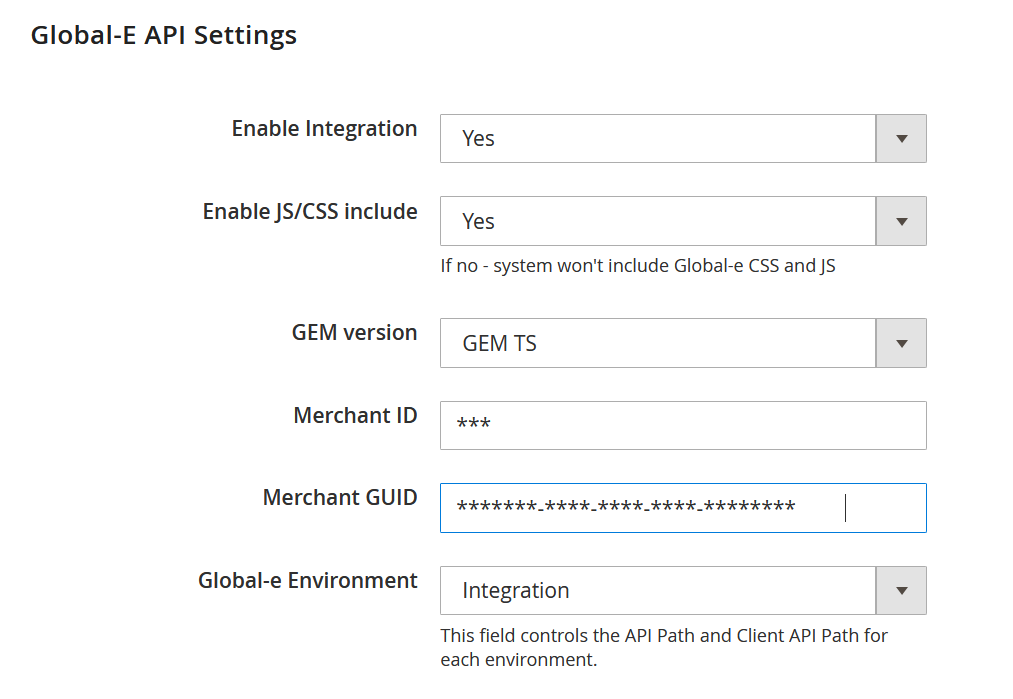Installation
You can install the Global-e Magento2 Extension packages in one of two ways:
Extract the Zip file provided to you by Global-e that includes the two packages.
Run the composer-based installation directly from the Global-e repositories.
Composer-based Installation
The Magento platform natively supports the following installation method.
To install the Global-e Magento2 lite extension:
In your Magento2 installation, locate the composer.json file and open it.
The composer.json file includes information about both the Global-e package and its corresponding repository.
To avoid installing the old version, either remove or update the
'magento2_lite'version to'1.*'.Make sure to confirm with the Global-E Integration team that you are using the stable version of the module.
For example:
"require": { "globale/magento2_lite": "1.*", }Global-e provides you with the Bitbucket user and application passwords. Replace
[SOME_PASSWORD]with your actual password in the Bitbucket repository URL, as shown below.For example:
"repositories":[ { "type": "vcs", "url": "https://m2readonly:[email protected]/globaleteam/magento2_lite.git" }Note
If necessary, Global-e can provide an alternative package version during integration.
Global‑e repositories are not publicly accessible, but read-only access can be requested.
Run the standard Magento2 deploy scripts.
Make sure that the Global-e modules are enabled:
Globale_BrowsingLiteGlobale_OrderLite
For information on enabling modules, see the Magento documentation.
Installation Using a Zip Archive
You can also install the Global-e modules by extracting the Zip file from Global-e, following the instructions below.
Extract the zip file to the app/code directory.
Run the standard Magento2 deploy scripts.
Ensure that the Global-e modules are enabled:
Globale_BrowsingLite
Globale_OrderLite
Configuration
The Global‑e Magento2 Lite extension provides a configuration screen that allows actual activation of Global‑e Integration on the website along with other settings:
Stores -> Configuration -> Services -> Global-E Integration Lite:
 |
All configuration details will be provided by Global‑e during the integration step.
Headless Installation
Global-e Routes
If a full page cache requires a whitelist of dynamic URLs, the following patterns should be whitelisted to support Global-e integration
Frontend area:
/international-ge/*
/international/*
Admin area:
/globale/*
Additionally, Global-e uses Magento2’s REST APIs. Make sure to enable them.
Make sure not to cache them (remove them from varnish or any other cache mechanism).
Global-e Includes and Store Variables
The following Magento configuration values ( core_config_data table) are used to add includes:
'globale_browsing_lite/api_settings/enable_gem_include'
• 'globale_browsing_lite/api_settings/integration_enabled'
'globale_browsing_lite/api_settings/gem_base_url'
'globale_browsing_lite/api_settings/merchant_id'
Include of CSS:
Note: we recommend placing it at the top of the page
if ('globale_browsing_lite/api_settings/enable_gem_include' && globale_browsing_lite/api_settings/integration_enabled')
Add the following HTML:
<link rel="stylesheet" id="GEPIStyles" type="text/css" href="CSS_REF">
Where CSS_REF build as contacting configs with constant string:
'globale_browsing_lite/api_settings/gem_base_url' + 'includes/css/' + 'globale_browsing_lite/api_settings/merchant_id'
Example:
MerchantId = 760
Environment → Production
<link rel="stylesheet" id="GEPIStyles" type="text/css" href="//gepi.global-e.com/includes/css/760>
Include JavaScript
Note: We recommend placing it before body end
if ('globale_browsing_lite/api_settings/enable_gem_include' && 'globale_browsing_lite/api_settings/integration_enabled')
Add the following JavaScript:
<script id="globaleScript">
var geStoreCode = ‘STORE_CODE’;
var geStoreCodeInstance = ‘STORE_INSTANCE’;
var preferedCulture = PreferedCulture‘’;
(function () {
var s = document.createElement('script');
s.type = 'text/javascript';
s.async = true;
s.src = ' JS_SRC ';
document.getElementsByTagName('head')[0].appendChild(s);
})();
</script>Where JS_SRC build as contacting configs with constant string:
'globale_browsing_lite/api_settings/gem_base_url' + 'includes/js/' + 'globale_browsing_lite/api_settings/merchant_id'
STORE_CODE – is a standard Magento StoreCode storeManager->getStore()>getCode();
STORE_INSTANCE – is BaseUrl without https://
PreferedCulture – is culture code that we are getting from locale that mapped to Global-e.
You can see the usage in vendor/globale/magento2_lite/src/BrowsingLite/Observer/CookieInitialiser.php
locale → \Magento\Framework\Locale\Resolver
CultureHelper → Globale\BrowsingLite\Helper\Culture
$locale = $this->locale->getLocale(); $preferredCulture = $this->cultureHelper- >getGlobalECultureCodeByMagentoLocale($locale);
You can see how it builds on regular installation:
vendor/globale/magento2_lite/src/BrowsingLite/view/frontend/templates/client_js.phtml vendor/globale/magento2_lite/src/BrowsingLite/view/frontend/templates/client_css.phtml vendor/globale/magento2_lite/src/BrowsingLite/Block/Client.php vendor/globale/magento2_lite/src/BrowsingLite/Observer/CookieInitialiser.php
For example (same merchant) :
<script id="globaleScript">
var geStoreCode = 'en';
var geStoreCodeInstance = 'www.boucheron.com';
(function () {
var s = document.createElement('script');
s.type = 'text/javascript';
s.async = true;
s.src = '//gepi.global-e.com/includes/js/760';
document.getElementsByTagName('head')[0].appendChild(s);
})();
</script>